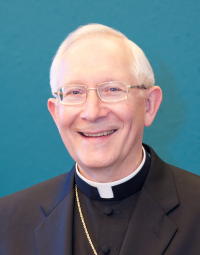
Archbishop Leonard P. Blair
Once again this year, at Pope Francis’ direc-tion, the third Sunday of January has been designated “Word of God Sunday.”
Most Christians, including Catholics, will immediately think of the Bible. However, the reality goes much deeper, and a fuller understanding of the “Word of God” is essential for knowing our faith and applying it to our own life and to the questions of our day.
The starting point is not a book but a living person, Jesus Christ. “In the beginning was the Word, and the Word was with God, and the Word was God … And the Word became flesh and made his dwelling among us, and we saw his glory, the glory as of the Father’s only Son, full of grace and truth.” (Jn 1)
This should be obvious to a believer, yet how often people read the Bible as if it were just an ancient book of history, ethics, or even religion. For Christianity, “all Sacred Scripture is but one book, and this book is Christ, because all Sacred Scripture speaks of Christ, and all Sacred Scripture is fulfilled in Christ.” (Hugh of St. Victor) The Church does not distinguish “Hebrew Scriptures” and “Christian Scriptures” for the Old and New Testaments, as if the one pertained to the Jewish people and the other to Christians. Certainly we honor and respect the faith of the Jewish people contained in the Old Testament, which can be an object of study in its own right. However, when it comes to our formation in the faith, the Old Testament too is about Jesus Christ, who from the beginning was destined to be its fulfillment.
It is also important to remember that the Word of God was proclaimed, and the Church was alive and well, before the books of the New Testament were written! The U.S. Adult Catechism states: “Both the living Tradition and the written Scriptures have their common source in the revelation of God in Jesus Christ. This is particularly important to understand and believe when one is faced with the postmodern attitude that Tradition cannot be trusted, and that what the Church teaches as Tradition is really just a reflection of particular judgments and biases. Knowing that what Tradition teaches has its ultimate foundation in Jesus Christ helps a person of faith to respond with trust.” (p. 25f )
Many of today’s media stories on the Bible treat it as an object separated from the Tradition exercised by the authority of the Apostles and their successors, the Bishops. For example, when ancient heretical texts are “rediscovered,” they are often reported as authentic voices of ancient Christianity that were suppressed by church authorities for self-serving motives. However, one can readily see what the New Testament says about false teaching, and the need to discern and reject it. The authority of Tradition has been exercised in these matters from the beginning. That is why not everything in circulation in New Testament times made its way into the Bible.
Today it is not uncommon to find Bibles marked with hand-written “corrections” by people who think they know what God really meant to say, or would have said had he lived to see “enlightened” times like ours! God’s Word certainly admits of interpretation, cultural context and the insights of scientific biblical scholarship, but there is often something else at work in modern “bible wars.” The late American theologian Avery Cardinal Dulles, writing about the reservation of priestly ordination to men, once said this: “Radical theology adopts a sharply critical attitude toward all the supposedly sacred sources. It criticizes popes and bishops in the light of tradition, but then criticizes tradition in the light of Scripture, and scripture in the light of the “historical” Jesus. If the historical reconstruction of Jesus does not yield the desired result, Jesus himself is criticized in the light of whatever seems good and proper to the contemporary critic.” These are just a few examples of the issues and questions we face when it comes to the Word of God in the life and mission of the Church today. May we be firm in our faith that God’s Word is truly “a lamp for my feet, a light to my path.” (Ps. 119)
